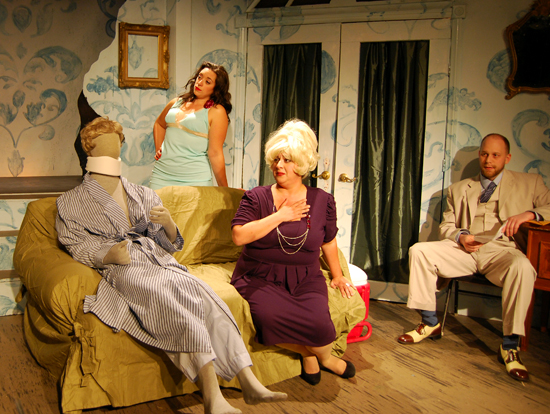Despite struggling to compete among big productions playing in popular venues such as the Ahmanson Theatre, small theater continues to hold its own, thanks to the Ark Theatre Company, one of the few of its kind in Los Angeles.
Created by Paul Wagar, assistant professor of voice and speech in the UCLA School of Theater, Film and Television, the Ark Theatre Company began in 2000 when Wagar and a friend wanted to work together.
“We just thought it might be fun to actually do something where I directed one piece and he directed another. It was a way to work together because we never had a chance to do that,” Wagar said.
One production led to another, and Ark was created, with its focus on small theater productions that celebrate classical theater. Ark also performs contemporary productions that take classical works and reinvent them in new ways. Wagar serves as the artistic director for Ark.
Now in its 11th season, Ark is currently running “The Glass Mendacity,” a spoof that brings together characters from three of Tennessee Williams’ plays: “The Glass Menagerie,” “A Street Car Named Desire” and “Cat on a Hot Tin Roof.” Featuring a six-person ensemble, “The Glass Mendacity” centers on what would happen if the characters in the plays interacted.
Though there are no UCLA students in this production, UCLA students do participate in Ark, making up a small part of the 35 to 40 members in the company. Though Ark holds ongoing auditions every three months, it is still difficult to join the group.
“(Our membership) is not as most as many L.A. companies go,” Wagar said. “Our membership is rather small, but we’re not deliberately keeping things small. The turnover is such that I look for people in auditions that have the ability to connect to thought and text. I’d rather keep it small with people who are more capable, better trained, more aware of what is required to do with the text that we work with.”
For Wagar, whether a prospective performer becomes a part of Ark depends on the actor or actress and their ability to work with the text.
“It’s really more a question of working with trained actors than opposed with not trained actors,” Wagar said. “Trained people speak the same language, require less coaching and understand how a script works. They help make things go a whole lot faster and easier and ultimately making it more rewarding.”
Depending on the material in the play, sometimes Wagar opens up the opportunity for auditioning to his students. Despite having few UCLA students in Ark, those who are involved beat out many in auditions, including those who are full-time professional actors.
“To be “˜professional,’ all (actors) need is an actor card ““ their union card ““ which has nothing to do with training,” Wagar said. “When working with theater, it makes a huge difference to work with trained people. Some of my graduate students are much better-trained than the vast majority that auditioned.”
For the graduate students that do audition and become involved with Ark, one of the main incentives to do so is to work with Wagar himself.
“Paul is a great mentor to me and I really appreciate his methodologies and his focus on text and voice and speech,” said Mike Fallon, a graduate student in acting. Fallon is a dues-paying member of Ark, which allows him to be actively involved with Ark by having a say in some of the Ark company decisions. Fallon also assists Wagar in training actors in voice and speech for classical works.
For Fallon, another incentive for being involved with Ark is that the theater company helps to keep small theater going in Los Angeles.
“Small theater in Los Angeles is struggling at the moment and I know Ark is doing everything they can to keep small theater alive,” Fallon said. “Small theater is really great because the focus doesn’t have to be on profit margins. There is a level of intimacy and exploration that is found in small theater that isn’t always found in larger venues and larger companies like the Ahmanson.”
Even if one is not a dues-paying member or a graduate student, UCLA undergraduates can take part in Ark productions, like third-year theater student Zack Hamra did. Hamra learned of Ark when he was looking for auditions, and after participating in an Ark production, Hamra ended up enjoying his experience.
“I really liked working with the company and the members,” Hamra said. “I like the professionalism of the company more so than some of the others that I worked with. And having Paul Wagar attached to it was a good thing as well, because he is a great voice and speech coach. He knew how to work and direct an actor.”
Ark’s overall mission is not limited to creating art; it also includes involving the community by exposing people to small theater and showing the benefits of artistic performances.
“Ark is very intent on community outreach,” Fallon said. “The role that art can have in shaping a community is really indescribable. If we can make it known to young people that there is an outlet for them that is healthy and safe and artistic and rewarding, such as small theater in Los Angeles, then they should really take advantage of it, whether it means participating as an actor or a tech member, or participating as an audience member.”
